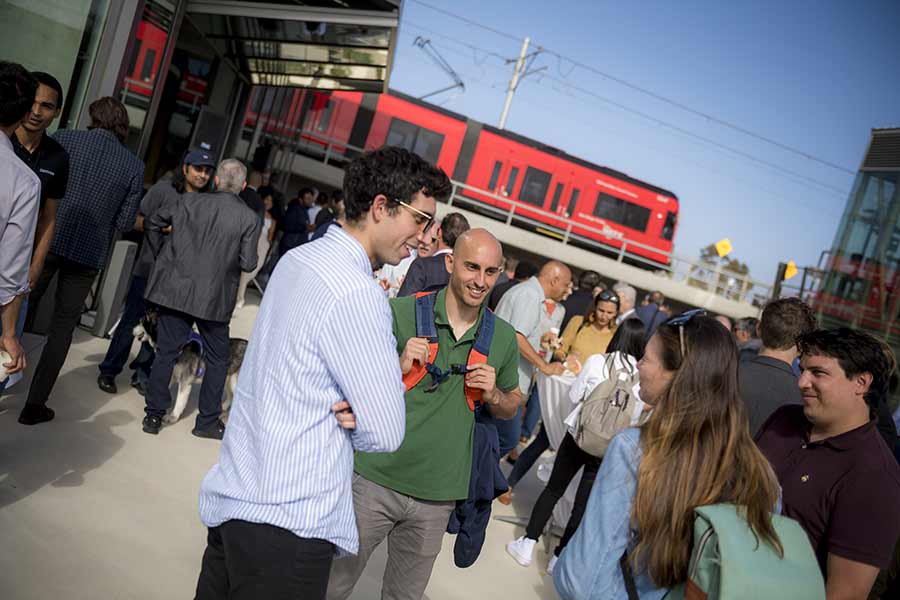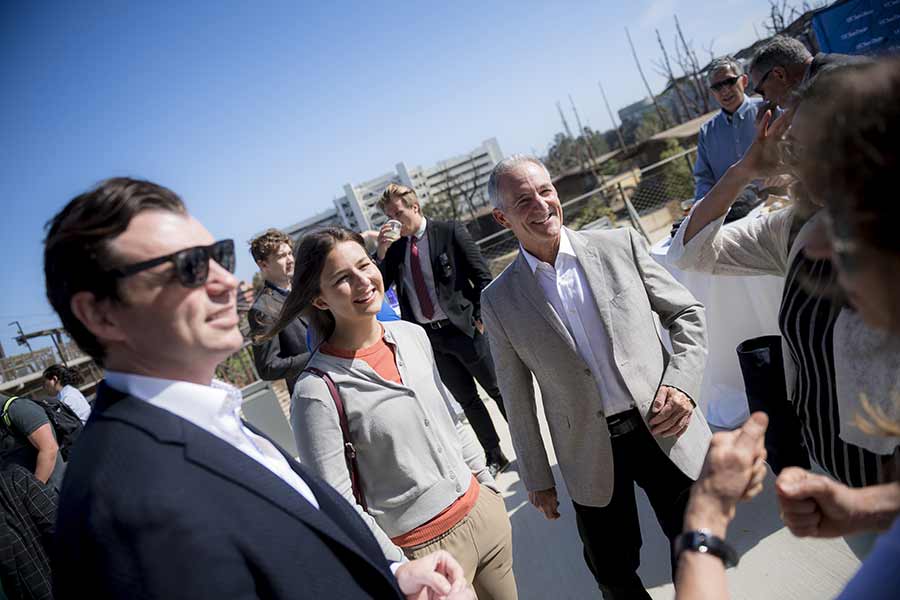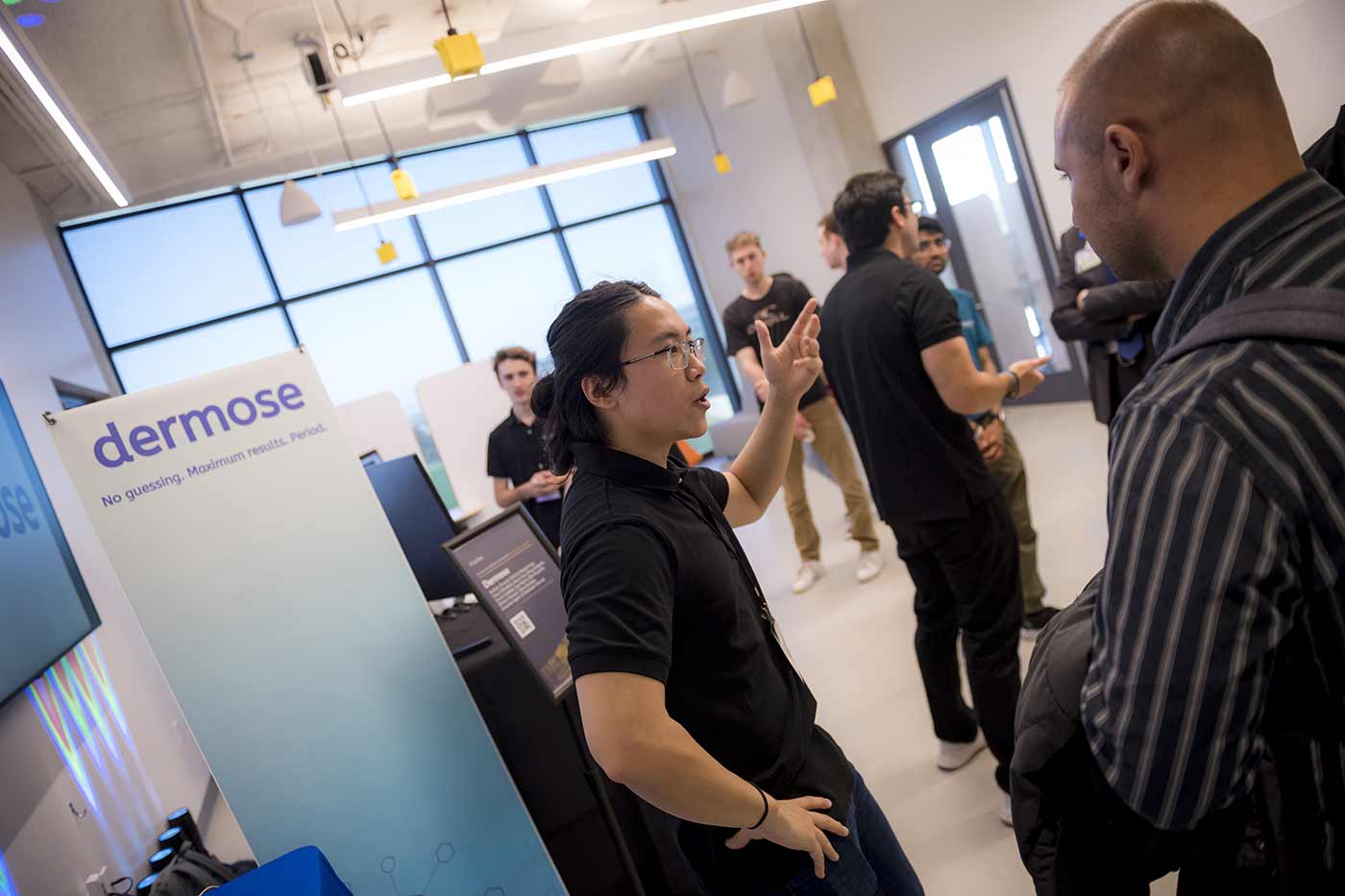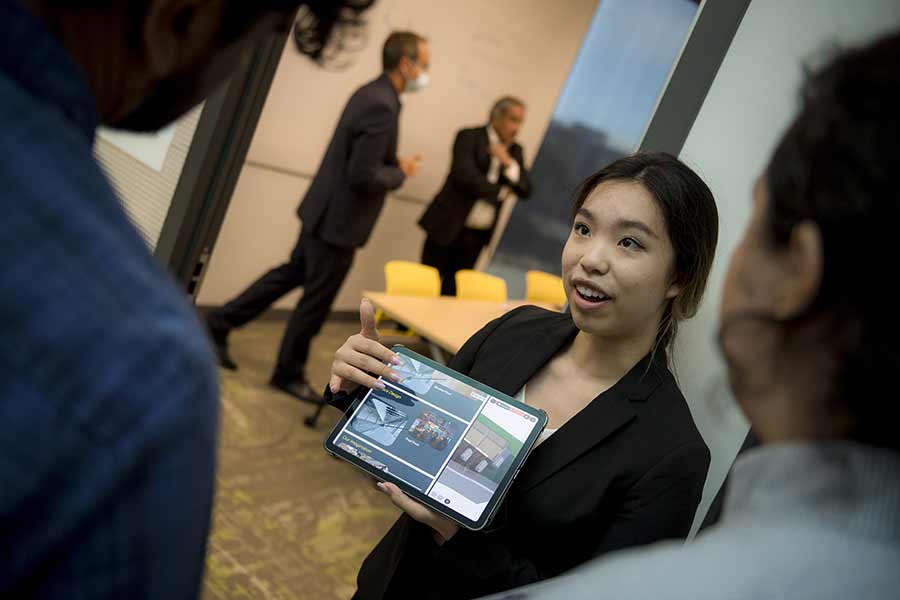By:
- Debra Bass
Published Date
By:
- Debra Bass
Share This:
Entrepreneurship Isn’t Genetic—It’s a Mindset
New center expands access to business leaders, training and funding sources

Attendees gather on the second-floor terrace of the Design and Innovation Building for the outdoor reception. Photos by Erik Jepsen/University Communications
In a bold display of support for cultivating an intrepid mindset across campus, the Entrepreneurship Center, located within the Design and Innovation Building, officially launched last week. The private gathering welcomed students, faculty, university officials and business collaborators to visit with representatives from dozens of companies residing in the building.
UC San Diego’s newest center creates a hub for San Diego’s innovation community by housing an array of regional entrepreneurs and venture capitalists alongside students and faculty with the intent of accelerating the creation and launch of new companies. The center also seeks to create an entrepreneur network and to dispel the notion that entrepreneurship is somehow genetic. The center encourages everyone to explore and act on their ideas to make improvements to the world around them and to collaborate with others who have the skills they lack.
The event also welcomed the newest cohort of professional Entrepreneurs in Residence, a campus-wide program launched in 2015 to support research-based entrepreneurship. The cohort includes a newly established selection of National Security entrepreneurs.

The Chancellor delivers remarks commemorating the official opening of the Entrepreneurship Center.
The innovators and “serial” entrepreneurs share their knowledge, provide mentoring, teach workshops and provide opportunities for students to hone their ideas and practical career skills by working and collaborating on projects with established companies and seasoned executives.
Chancellor Pradeep K. Khosla called the Entrepreneurship Center “a resource with no boundaries that supports our entire Triton community.”
He explained that entrepreneurial skills—learning to present ideas, persuade listeners and enlist support—are beneficial tools regardless of a student’s major or ultimate career goals.
“People ask why we’re promoting entrepreneurship across all disciplines,” Khosla said. “The answer is that every human being has a use for the properties of entrepreneurial thinking. You don’t have to start a company to use these properties.”
Khosla described thinking like an entrepreneur as the ability to identify an opportunity, understand the risk and execute a plan while mitigating risk—Actions that could be associated with visual artists, theatrical performers, biomechanical engineers or chemists.

Business leaders, faculty and students discuss university aims to spark a culture of entrepreneurship.
Entrepreneurship isn’t a special trait or isolated skill, he said, noting that bold business ventures often lack diversity because too many people lack exposure to entrepreneurial training or settings where they can discuss ideas with people who are knowledgeable in what it takes to get a business off the ground.
The Design and Innovation Building, or DIB, has four levels (and four floors) to progress an idea figuratively and physically from inception and workshopping, to prototype, funding and launch. The Entrepreneurship Center resides on the top floor. The Basement, a storied startup incubator and accelerator, has a commanding space on the ground floor.
Pitch hits
Vice Chancellor of Research Cori Peek-Asa explained that UC San Diego offers an opportunity for collaboration that exists on very few campuses in the nation.
“The interdisciplinary focus of our campus creates diverse teams and unique opportunities that allow us to take advantage of unconventional thinking that can solve problems in dynamic and exciting new ways,” Peek-Asa said.
She noted that the teams present for the event were working on solutions to problems as broad as destigmatizing the availability of menstrual products in public areas (Dotstash) to creating prosthetics and orthotics that are more comfortable, functional and affordable (LIMBER).

Businesses developed at UC San Diego by students, alumni or community partners newly located in the Entrepreneurship Center gave presentations.
Other projects ventured into virtual reality world-building (Origami Air), high-tech hair loss treatment (Dermose), energy saving in laboratories (The Lichen Lab Co.) and creating sustainable plastic alternatives from kelp (Algeon Materials).
Inclusive entrepreneurship
Ultimately, the center is meant to be a place of opportunity without judgment.
“We are not going to be in the business of vetting technology. We want to encourage exploration by enabling a culture of entrepreneurship like we have never seen before,” Khosla said.
Each year, the center and resident entrepreneurs will support more than 60 project teams and more than 20 burgeoning businesses. The only payment is to sign an operating agreement that supports the ethical principles of UC San Diego’s campus.

Attendees networking with resident startups at the Entrepreneurship Center asked questions about the origins and aims of each business.
Associate Vice Chancellor for Innovation and Commercialization Paul Roben, who oversees the DIB and the new Entrepreneurship Center, said that he wants to change the perception of entrepreneurship as being exclusive.
“Our ultimate goal is to inspire more students and community affiliates to follow their dreams, develop new strategies for old problems and shape the future through new technology,” Roben said. “We have created a safe space by knocking down all the traditional barriers to entrepreneurship.”
He said that anyone with an idea will find a community to explore their ideas. Many will fail but that’s all part of the process to getting ideas off the ground by encouraging them to keep going, even if that means changing course.
Share This:
You May Also Like
Stay in the Know
Keep up with all the latest from UC San Diego. Subscribe to the newsletter today.



